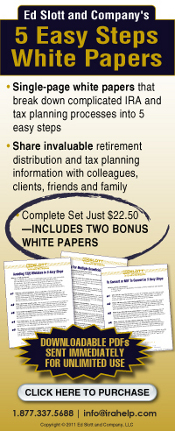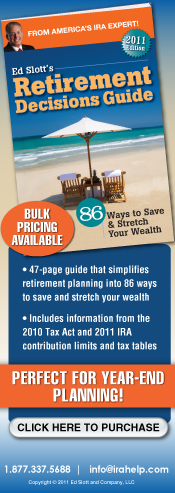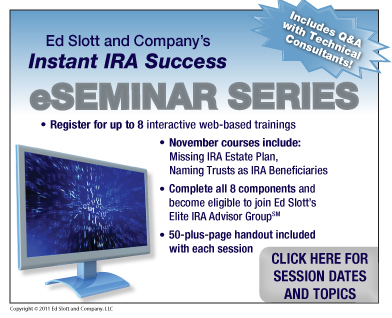
In This Update:
- Q of the Month:
Can I Avoid Tax on RMDs in a Tax-Free Shelter?
- Key Focus:
What the 2012 IRA and Tax Changes Really Mean
- Ruling to Remember:
How Not to Invest Your IRA in a Hedge Fund
Resources
- Ask Us To Speak
- Ed Slott's IRA Advisor Newsletter
- Shopping Cart
- Discussion Forum
- IRA Resources
- IRA and Tax Tables
Professional
Assistance
?? Question of the Month: Can I avoid tax on required distributions in a tax-free shelter?
Q: My wife and I are 69 and 70 years old respectively, and our 401(k) is worth $505,000 as of today. We are both retired with a monthly income of about $7,000. We have about $150,000 in life insurance. We will soon have to start taking money from the 401(k) as per the IRS rules. Where can we find information on tax-free shelters to avoid the heavy tax when we take required mimimum distributions (RMDs)?
A: There is no way to avoid the taxation on required minimum distributions of taxable amounts from the 401(k) plan. Moving the 401(k) funds to a tax-free shelter will not avoid the required distribution rules. Perhaps you should consider converting your 401(k) to a Roth IRA if you have enough money to pay the tax. There would be no required minimum distributions going forward with a Roth IRA.
IN TODAY’S TIMES, BUSINESS MUST BE EARNED
WE PROVIDE THE IRA STRATEGIES YOU NEED
REGISTER EARLY AND BRING YOUR OFFICE!
CONTACT US AT 877-337-5688 FOR GROUP DISCOUNT RATES
Self-Directed IRAs and Fraud, 2011-2012 Estate Exemption Portability
|
The November issue of Ed Slott's IRA Advisor Newsletter discusses self-directed IRAs and the risk of fraud along with the 2011-2012 estate exemption portability guidance from IRS. The Securities and Exchange Commission issued an “Investor Alert” in September 2011 warning investors to be wary of fraudulent promoters targeting self-directed IRA funds. |

|
READ MORE IN NOVEMBER’S ISSUE OF ED SLOTT’S IRA ADVISOR NEWSLETTER | |
Inside Ed Slott's IRA Advisor NewsletterSEC Warning Investor Alert: Self-Directed IRAs and the Risk of Fraud
7 Self-Directed IRA Issues Advisors Should Review with Clients Before They Take the Plunge 2011-2012 Estate Exemption Portability Guidance From IRS
Guest IRA Expert Advisors To The Rescue! If you are not already an Ed Slott's IRA Advisor Newsletter subscriber, you can preview past issues before subscribing. |
|
|
||
|
|||




 November Key Focus
November Key Focus Ruling to Remember
Ruling to Remember